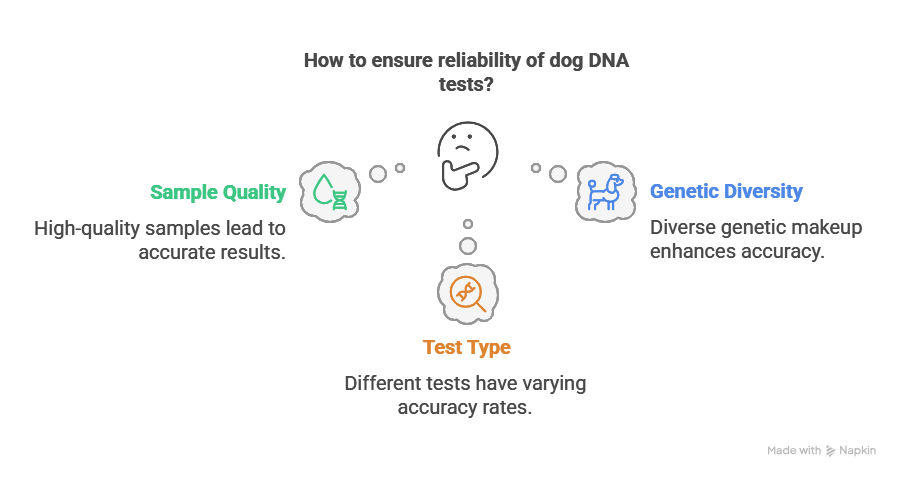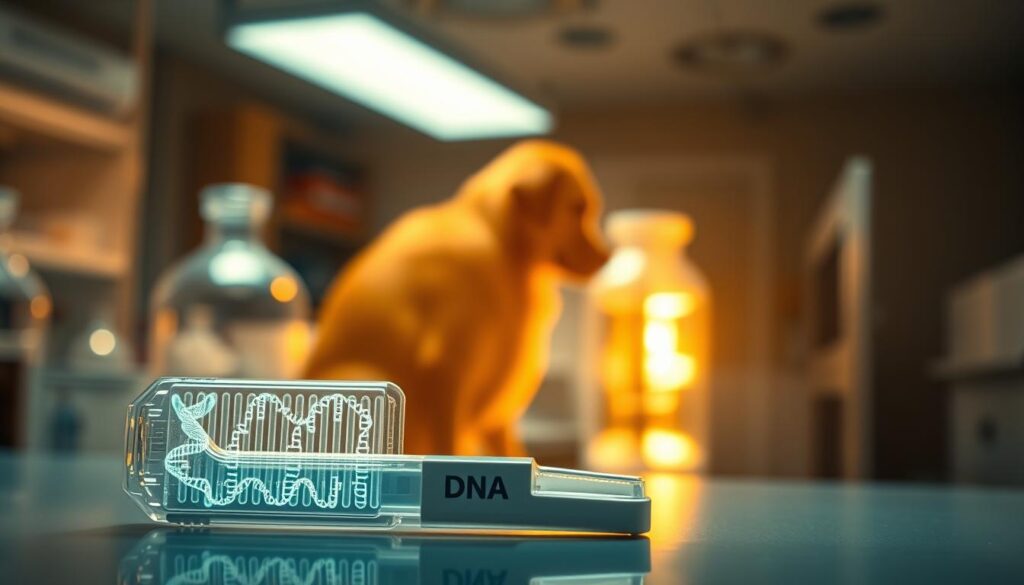As a pet owner, understanding your dog’s ancestry and genetic health can be both fascinating and crucial for their well-being. The rise of dog DNA tests has made it possible to uncover the secrets hidden in your dog’s genetic code. But how reliable are these tests?
With the increasing popularity of dog DNA testing, it’s essential to understand the accuracy of these tests. Companies like Embark and Wisdom Panel have made significant strides in this field, offering insights into breed ancestry, genetic traits, and potential health risks.
Before diving into the world of dog DNA testing, pet owners should be aware of what to expect from these tests and their limitations. This knowledge will help you make informed decisions about your pet’s health and ancestry.
Understanding Dog DNA Tests: How They Work
Understanding the mechanics behind dog DNA tests can help pet owners make informed decisions about their use. Dog DNA tests analyze a dog’s genetic material to provide insights into their breed ancestry, potential health risks, and other characteristics.
The Science Behind Canine Genetic Testing
Canine genetic testing relies on DNA analysis to identify specific genetic markers associated with certain breeds or health conditions. This is achieved through a process known as genotyping, where the genetic information at particular locations on the dog’s DNA is examined.
Sample Collection and Laboratory Processing
The process begins with a simple cheek swab or blood sample from the dog. The DNA is then extracted and analyzed in a laboratory using advanced technology. The results are compared to a comprehensive database of known canine genetic profiles to determine breed composition and potential health risks.
| Test Type | Sample Required | Analysis Time |
|---|---|---|
| Breed Identification | Cheek Swab | 2-3 weeks |
| Health Risk Assessment | Blood Sample | 3-4 weeks |
Are Dog DNA Tests Accurate? Examining the Evidence
The accuracy of dog DNA tests is a pressing concern for many pet owners who are considering genetic testing for their canine companions. As the popularity of these tests continues to grow, it’s essential to examine the evidence and understand what affects their precision.
Accuracy Rates of Major Testing Companies
Several major companies offer dog DNA testing services, each with its own accuracy rates. For instance:
- Company A claims an accuracy rate of 95% for breed identification.
- Company B reports a slightly lower accuracy rate of 90%, but provides more detailed health insights.
- Company C boasts an accuracy rate of 98%, but at a higher cost.
These varying accuracy rates highlight the importance of choosing a reputable testing company.

Factors That Impact Test Reliability
Several factors can impact the reliability of dog DNA tests, including:
- Sample quality: A high-quality DNA sample is crucial for accurate test results.
- Genetic diversity: Dogs with a more diverse genetic makeup may have more accurate test results.
- Test type: Different types of tests (e.g., breed identification vs. health screening) may have varying accuracy rates.
Understanding these factors can help pet owners make informed decisions about dog DNA testing.
What Dog DNA Tests Can (and Cannot) Tell You
As pet owners explore the world of dog DNA testing, it’s essential to know what these tests can reveal about their pets. Dog DNA tests have gained popularity for their ability to provide insights into a dog’s breed ancestry, potential health risks, and genetic traits.
Health Insights and Breed Identification Benefits
Dog DNA tests can offer valuable information about a dog’s breed composition and potential health issues. For instance, some tests can identify genetic markers associated with specific diseases, allowing pet owners to take preventive measures. Major testing companies like Embark and Wisdom Panel provide detailed reports on breed ancestry, which can be fascinating for pet owners curious about their dog’s heritage.
| Testing Company | Breed Identification | Health Risk Assessment |
|---|---|---|
| Embark | Detailed breed ancestry | Genetic testing for over 200 conditions |
| Wisdom Panel | Breed identification with genetic diversity | Screening for various genetic disorders |
Limitations and Potential Misinterpretations
While dog DNA tests offer several benefits, it’s crucial to understand their limitations. The accuracy of genetic testing for dogs can vary depending on the company’s database and testing methods. Some tests may not cover all breeds or genetic conditions, and results can sometimes be misinterpreted if not understood in the context of the dog’s overall health and medical history.

By understanding what dog DNA tests can and cannot tell you, pet owners can make informed decisions about their use. It’s also important to consult with a veterinarian to interpret test results accurately and determine the best course of action for your dog’s health.
Conclusion: Making Informed Decisions About Dog DNA Testing
Understanding dog dna test accuracy is crucial for pet owners considering genetic testing for their canine companions. As discussed, the accuracy of these tests can vary depending on several factors, including the testing company and sample quality.
By being aware of the potential benefits and limitations of dog dna tests, pet owners can make informed decisions about whether to pursue testing and how to interpret the results. Companies like Embark and Wisdom Panel have made significant strides in canine genetic testing, offering valuable insights into a dog’s breed ancestry and potential health risks.
Ultimately, dog dna testing can be a valuable tool for pet owners who want to better understand their dog’s needs and provide the best possible care. By staying informed and understanding the dog dna test accuracy, pet owners can harness the power of genetic testing to enhance their dog’s health and well-being.
FAQ
How accurate are dog DNA tests?
The accuracy of dog DNA tests varies depending on the company and the specific test. Companies like Embark and Wisdom Panel have reported accuracy rates ranging from 90% to 99% for breed identification. However, the accuracy can be influenced by factors such as the quality of the DNA sample and the comprehensiveness of the breed database.
What factors affect the reliability of dog DNA tests?
Several factors can impact the reliability of dog DNA tests, including the quality of the DNA sample, the size and diversity of the breed database, and the testing methodology used. Additionally, mixed-breed dogs can be more challenging to test accurately due to the complexity of their genetic makeup.
Can dog DNA tests identify a dog’s breed mix?
Yes, many dog DNA tests can identify a dog’s breed mix by comparing the dog’s DNA to a database of known breeds. However, the accuracy of breed identification can vary depending on the test and the individual dog’s genetic makeup.
Are dog DNA tests useful for identifying potential health risks?
Yes, many dog DNA tests can identify potential health risks by screening for genetic mutations associated with specific health conditions. Companies like Embark offer health testing for over 200 genetic conditions, providing valuable insights for pet owners.
How do I choose a reliable dog DNA testing company?
When choosing a dog DNA testing company, consider factors such as the comprehensiveness of their breed database, the accuracy of their test results, and their testing methodology. Look for companies that provide transparent information about their testing processes and have a strong reputation among pet owners and veterinarians.
Can dog DNA tests be used to determine a dog’s ancestry?
Yes, dog DNA tests can be used to determine a dog’s ancestry by analyzing their genetic data and comparing it to a database of known breeds. However, the accuracy of ancestry testing can vary depending on the test and the individual dog’s genetic makeup.
Are the results of dog DNA tests precise?
The precision of dog DNA test results depends on various factors, including the quality of the DNA sample and the testing methodology used. While some tests may provide more precise results than others, it’s essential to understand the limitations and potential margins of error when interpreting test results.






One thought on “Are Dog DNA Tests Accurate? What Pet Owners Should Know”